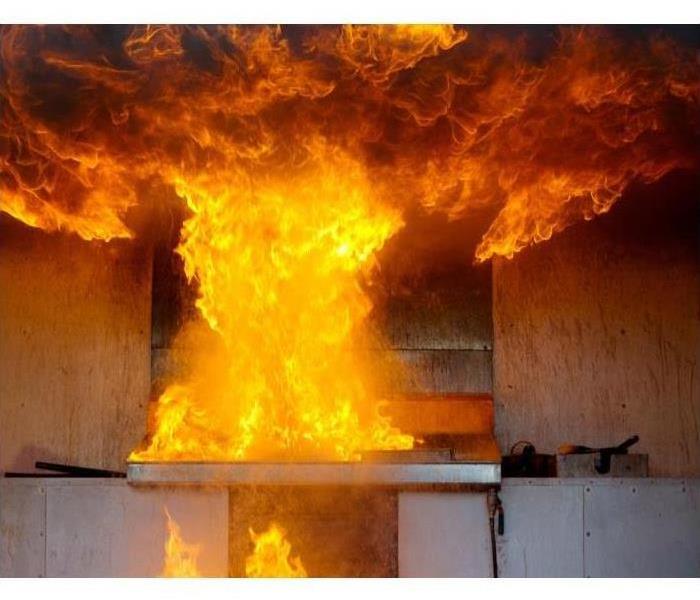Cooking and Fire Prevention Safety
10/24/2018 (Permalink)
The Holidays are upon us and we will be doing more cooking. And unless you live on takeout and fast food, cooking is necessary to feed your family. But not all of us were born Emeril Lagasse or Gordon Ramsay. We novice chefs need a little more help. And sometimes, accidents happen. According to the NFPA (National Fire Prevention Association) Two-thirds (67%) of home cooking fires started with the ignition of food or other cooking materials. Before you cook up a disaster, know how to put out potential fires.
How to prevent a kitchen fire
Stay nearby, this sounds unnecessary to say but unattended cooking are by far the leading cause of kitchen fires. According to the NFPA, unattended cooking is the leading cause of kitchen fires. Don’t leave your boiling spaghetti alone!
Place your products elsewhere Keep your towels, paper towels and pot holders away from open flames because they pose a fire hazard.
Have the proper tools. Besides a lid and a fire extinguisher, ensure smoke detectors are working properly test them biannually. When cooking on a stove top, always keep a lid nearby that fits the pot or pan you’re using. That way, if the food catches fire, you can put the lid on to quickly smother the flames.
Salt, a handful of salt, which cuts off the oxygen supply and smothers the fire.
Baking soda, like salt, baking soda works to put out grease fires, Sexton says. For example, if grease falls to the bottom of the oven and catches fire, covering it with baking soda should put it out.
Fire extinguisher. If you don’t have access to salt, baking soda or water, use a fire extinguisher. Keep one handy in your kitchen in case of emergencies, Reith and Sexton suggest. Know where it is and how to use it.
Water
If your towel or pot holder catches fire, put it in the kitchen sink and douse it with water. But never use water to put out a grease fire. Pouring water onto a grease fire will make a bad situation worse. This can cause burning oil to splatter or even bigger flames to form. Burning drops of grease or oil can spread quickly out of control.
How to put out a kitchen fire. Smother the flames Fire needs oxygen to thrive. Thwart flames by cutting off their supply. Turn off the heat. Remember to turn the burner off when a fire occurs. If the fire starts in an appliance, like your oven or microwave, immediately cut the power source and close the door, Sexton says. If you catch it early enough, there won’t be enough oxygen, and the fire will die.
Evacuate. Don’t be a hero. If a fire gets out of hand, you should get out of there. According to the National Fire Protection Association, 55 percent of non-fatal home cooking fire injuries occurred when the victims tried fighting the fire themselves.
Call 911 - Emergency service providers undergo many hours of training to handle these situations, so avoid putting yourself at unnecessary risk. Let professionals who know the risks and dangers handle it. According to the city website for the FY 2017 Winston Salem has responded to 769 fires. That is actually down from 2015 when they responded to 819 fires.
Be sure to stay safe and for more information and tips on what to and not to do see our website SERVPRO of West Forsyth County. After the fire department leaves there will be damage, call SERVPRO of West Forsyth County to help make it “Like it never even happened.” It’s best to call us directly 336-946-1131






 24/7 Emergency Service
24/7 Emergency Service
